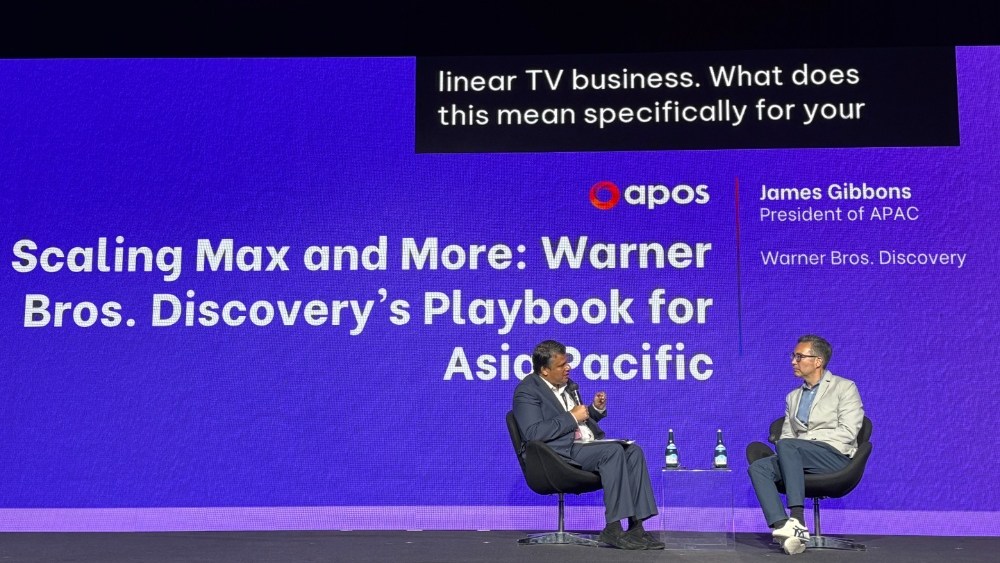Warner Bros. Discovery‘s Asia-Pacific president James Gibbons is bullish about the streaming service Max‘s performance across the region, even as the media giant prepares for a major corporate restructuring that will split its streaming and studios business from its traditional television networks.
Despite the corporate changes, Gibbons emphasized that strategic goals for the Asia-Pacific region remain unchanged. The executive was speaking at the APOS conference in Indonesia.
The executive was particularly enthusiastic about Max’s March launch in Australia, where the service positioned itself with the tagline “all killer, no filler” to differentiate from competitors in the crowded streaming landscape. “We’ve seen every expectation that we had in the market has been exceeded on every front,” Gibbons said, noting strong performance across subscribers, revenues and engagement metrics.
The Australian rollout marked the first time Warner Bros. Discovery launched an ad-supported tier for Max in the Asia-Pacific region, partnering with Nine Entertainment for ad sales. The service also launched exclusively through pay-TV provider Foxtel, giving it immediate access to Foxtel’s subscriber base while also being available directly to consumers.
“We’ve seen a tremendous authentication rate there,” Gibbons noted of the Foxtel partnership, “and then in the retail space, we were obviously available across the market to all segments which have never previously been the case in Australia.”
In Japan, Warner Bros. Discovery took a different approach, partnering with local streaming service U-Next rather than launching independently. The strategy has paid dividends, with Gibbons reporting that Max content viewing increased by more than 40% following the launch.
“By working with U-Next, who’ve done an incredible job in the last few months to be building up that platform, we were able to, on day one, access their entire base for Max, and secondly, sit alongside a very strong lineup of local Japanese content,” he explained.
While Max has built its reputation on premium international content, Gibbons acknowledged the need to invest more heavily in local productions to expand the addressable market. The company has already seen success with its anime studio in Japan, which produced “Batman Ninja vs. Yakuza League” exclusively for Max.
Warner Bros. Discovery also scored a major box office hit in Japan with “Cells at Work,” which Gibbons described as “the most successful, biggest box office in the history of all the movies we’ve ever produced in Japan, based on a manga in Japan.”
The executive highlighted the global impact of strategic casting decisions, pointing to Lisa from K-pop group Blackpink’s role in “The White Lotus” Season 3, filmed in Thailand. “That made Thailand possibly, if not the number one, one of the most successful markets of ‘White Lotus’ globally,” Gibbons said.
In Southeast Asia, Warner Bros. Discovery has primarily worked through partnerships due to legacy relationships with HBO channels and HBO Go. However, Gibbons indicated the company plans to focus more heavily on direct-to-consumer retail subscriptions going forward. “It’s just taking one step at a time to make sure that we’re focused,” he said.
For key markets like South Korea and India, Warner Bros. Discovery continues to work through partnerships with Coupang Play and JioStar respectively, though Gibbons suggested these arrangements could evolve as market conditions change.
Gibbons emphasized that Warner Bros. Discovery’s strategy extends far beyond streaming, leveraging popular franchises for theme park experiences and consumer products. The Harry Potter Studio Tour in Japan, which launched two years ago, remains “solidly booked out daily,” while a second location is planned for Shanghai.
“When you have a fan base, and you know you have streaming, which is essentially a fan base and IP engine that’s building, you have then the opportunity to serve that fan base with experiences, consumer products and games,” Gibbons explained.
The executive sees significant untapped potential in the Asia-Pacific region, noting that it’s “home to two thirds of the world’s population, three out of the five biggest economies” and represents a “tremendous market for streaming growth.”
Read the full article here


